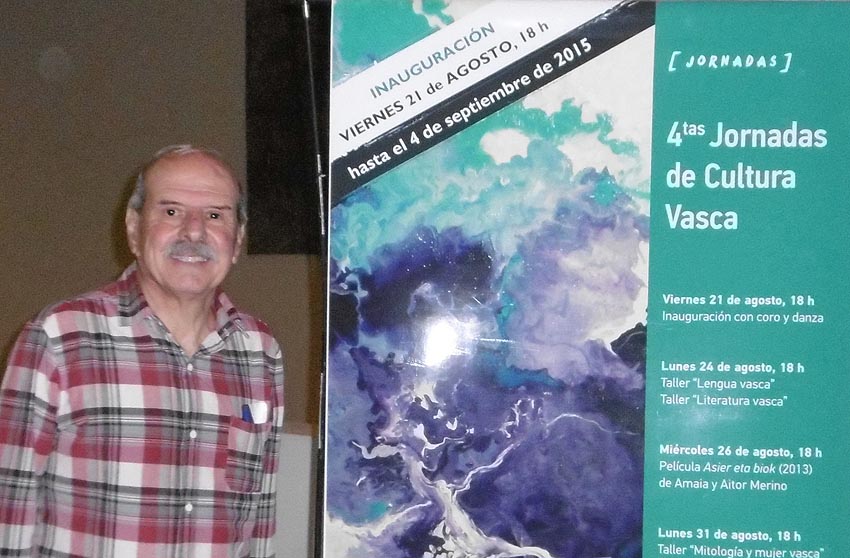Joseba Etxarri. Our interviewee is another Diaspora Basque for whom being Basque is not hidden in papers that coldly announces his geographic origin, but that is lived and reflected actively daily, with a commitment and enthusiasm for contributing to the degree in which he can to the community he feels a part of. Carlos Gabilondo is a retired history professor…although not withdrawn, since he continues to teach today, even if in a different way. Descendent of Agustin Gabilondo that arrived in Argentina in the 1860s Carlos comes from a family where many of his ancestors died young, so he didn’t have the pleasure of a grandfather to tell him stories, even though he does remember his uncle Osvaldo, “In reality he was of Italian ancestry, but he married my aunt Nelida, my father’s sister, who they called La Vasca (The Basque),” and they used to bring him to the pelota games that were played at the Euzko Etxea in La Plata. “They frequently traveled to the Basque Country and they told us about their adventures there,” he remembers.
Carlos Gabilondo is known today in the Basque clubs in Argentina as “the man of film.” He, along with his wife Norma, have surpassed over the last four years a hundred of screenings of Basque films, classical and modern, short and feature films, throughout the entire geography of Argentina at Basque clubs ranging from Eusko Etxea in Corpus Christi in the province of Misiones, a thousand kilometers northeast of Buenos Aires, to the young Basque club, Euskal Txokoa in San Martin de los Andes, in the middle of the Patagonian mountains, more than 2,500 from the previous. They arrive at all of them with their projector, film, cables and papers that they pass out with the synopsis of each title and ready to generously share their time, knowledge, excitement and dedication to the varied public that attend and participate in its forums; because what they foster after the screening is to talk, the contrast of opinions and debate, and they do it well, in a global environment where all this is scarce.
Since when have you been a fan of film?
-I became a fan in 82, when the dictatorship in Argentina was still in force, when we created in Lanus, at the Jewish Center, a film-forum where we showed titles that we received from the Argentine Filmatec, or Italian, French or German embassies. Many of these were prohibited in their original versions but we still got them. We had the support of Mr. Salvatore Samaritano, a huge diffuser of film in our country, who sponsored the cine-club. But the first Basque film that I remember and that impacted me was Ama-Lur by Fernando Larruquert and Nestor Basterretxea, whose screenings are still being requested. Allow me to confess my fanaticism for Montxo Armendariz, the Navarrese director whose cycle we are finishing at the Chair of Free Basque Thought in La Plata.
You are a retired History professor.
-That allows me the free time for my main interests: history and teaching, film and activity in the cine-club and my interest in Basque and the Basque culture. Beginning in 2010 and 2011, I participated in Buenos Aires in the Summer Basque University coordinated at the college Euskal Echea by Enrique Aramburu, and as part of that variety of disciplines that they began to teach, the possibility to include film arose. We worked inspired by a previous seminar given by Basque Country expert Juan Miguel Gutierrez and the material that he then provided us. Shortly after I started attending Basque language classes at the Euskaltzaleak Association and I was lucky enough to meet Teresa de Zavaleta who invited me to develop Basque film as a regular activity. Now we have shown 34 titles over the last four years only at Euskaltzaleak. It has become a regular activity that has included even people passing through Buenos Aires, as well as spectators and fans such as filmmakers and professionals. I remember when we showed Sukalde Kontuak and we had director Aizpea Goenaga in attendance, her testimony and comments to the public were really very interesting and before we knew it, it was 1am, but we still continued.
As many things in the Diaspora, all for art’s sake, or as they say in Argentina, ad honorem.
-Without a doubt. What is for sure is that I get enormous pleasure and need to return to the Basque culture and the community everything that I have been provided. It brings great satisfaction and the majority of the titles that we show are not available commercially in Argentina and so they aren’t seen if we don’t show them. It also gives me great satisfaction, for example, when I participate in screening films at the Library of Congress in Argentina with an audience that is mainly non-Basque. Screenings in Basque clubs, initially drew only 10 people or so, but today we are used to gathering 50, 60 or 80. We have traveled a road and we have many people to thank, clubs, institutions and friends.
Carlos Gabilondo’s Facebook page:






 Send to a friend
Send to a friend Add comment
Add comment








